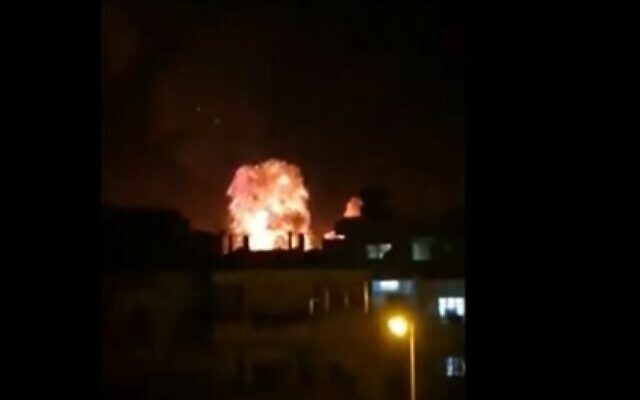Each wave of Israeli raids on Syria in the past years had been weighty. But the latest attacks, which occurred on Friday night, had an additional significance. Syria, in fact, has turned into a “letterbox” between Russia and Israel, as a result of tension over Ukraine on the one hand, and Iran’s efforts to “fill the vacuum” in Syria, on the other.
The most powerful Russian message came on May 13, when Israel launched raids in Syria. In an unprecedented move, the Hmeimim base operated the advanced S-300 missile system and targeted Israeli bombers as soon as the raids stopped. It was the first time that the Russian base used one of its three systems – the S-300, the advanced S-300, and the S-400 – since its deployment in Syria following the military intervention at the end of 2015.
This is an important development, especially as Moscow had given pledges to Tel Aviv that it would control the command room of the missile system in Syria, and prevent its fall into the grip of the Syrian Air Force, which operates the old systems such as the S-200 and below.
These understandings were underlined following efforts to alleviate Russian-Israeli tension in the wake of the targeting of a Russian plane in western Syria in September 2018.
Read Also: Russia Makes Contacts with Turkey on Flights to Syria
But why did Moscow change its behavior? Why did Mikhail Bogdanov, the envoy of Russian President Vladimir Putin, deny reports of the use of the system against Israeli planes?
According to a senior Western official, intelligence reports confirm that the Hmeimim base operated the system, in a rare incident, “because Russia wanted to tell Israel that its ability to chase Iranian targets was linked to Moscow’s decision, and that it should take this into consideration when taking a stance over the Ukrainian file.”
Since the outbreak of the Russian war in Ukraine, Tel Aviv has tried to play a “balanced role” and refused to hand over the Iron Dome to Kyiv. However, as the bombing intensified, political signs and an escalatory rhetoric emerged, along with talk of military support and the presence of Israeli “mercenaries” or experts alongside the Ukrainian army, followed by a diplomatic rift.
At this moment, Moscow sent a message to Tel Aviv through the “Syrian box.” The response – which came in the form of the Israeli bombing – was aimed at “testing the resolve” of the Russian side, along with a determination to chase “Iranian targets” in Syria. In fact, the latest raids on Friday were broader and more comprehensive than the previous ones, because they targeted points in the countryside of Damascus and central and western Syria, leading to the killing of Syrian officers.
Despite Bogdanov’s denials and claims that Western reports were “lies,” the Russian reminder not only affected Israel but also included hints to Damascus and Tehran that the military-air decision remained in Moscow.
This comes following the intense exchange of visits between Syrian and Iranian officials in recent weeks, including the visit of President Bashar al-Assad to Tehran, to work on “filling the Russian vacuum.”
The reminder also highlighted Israel’s adherence to its “red lines” in the phase-shifting between the Russian withdrawal and Iranian advances.
President Putin wants to say that despite his preoccupation with Ukraine, he has not forgotten Syria and its “players.” Or perhaps he wants to use it to improve his position in his great war in “Little Russia”.
Here, it was remarkable that after Jordanian officials announced that they had noticed a decline in the Russian military presence in southern Syria, with the possibility that Iran and its militias would advance to “fill the vacuum,” the Hmeimim base rushed to conduct Russian military patrols on the Syrian-Jordanian border.
The same can be said about the Russian messages to Turkey. The Hmeimim planes target from time to time areas of Turkish influence in northern Syria, to remind Ankara of the Russian papers when it reviews its decisions and options regarding the Dardanelles and Bosphorus corridors to the Black Sea, and when it discusses the request of Sweden and Finland to join the North Atlantic Treaty Organization (NATO).
So far, Putin has been able to use Syria as a “letterbox” and a platform to pressure players in Ukraine. Only time will tell whether Russia would be capable of maintaining this strategy, if the Ukrainian land turns into a “swamp” for the Russian forces, impacting the Russian depth and the theaters of the Middle East.
The Syrian Observer has not verified the content of this story. Responsibility for the information and views set out in this article lies entirely with the author.


